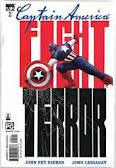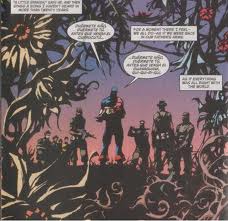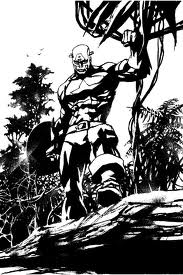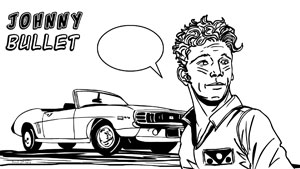|
|
 |
 |
To answer that question, one is forced to assess Dead Men Running in relation to the circumstances surrounding the change of an epoch. Captain America: Dead Men Running, with its artful narration and Danijel Zezelj's rough, inky, symbolic illustrations, was not ahead of its time. It was an almost unilaterally overlooked relic of pre-9/11 cynicism and pessimism. Writer Darko Macan asserted a quaint, Mamet-like predilection for incessant name reaffirmation; his was a simple morality tale that struggled to find its audience, further constrained by PG-13 sensibilities in lieu of bleak subject matter that wanted so badly to crossover into uninhibited realism; his series' run length was also perhaps too short to be collected in future trade formats; but perhaps what really doomed the three-issue miniseries to obscurity was its subtle subversion.
The first issue opens with a squad of American commandos radioing for extraction from the dense, hostile jungles of Columbia. In tow are several Columbian children, presumably liberated by the Americans. As an American plane passes overhead, the commandos' jubilation turns to bewildered disappointment as only a lone man can be seen parachuting from the aircraft into the jungle canopy. The Americans, children corralled and following, trudge deeper into the vegetation, certain their one-man rescue party is already dead, or if not dead then useless anyway.
 |
When Columbian guerillas tracking the Americans are in position to ambush the squad, Captain America, the lone parachuter, also emerges from the undergrowth, just in time to intervene. After the scuffle, Cap takes time to reassure the reticent Columbian children of their safety. He puts one girl at ease with a traditional lullaby in Spanish.
This is the first instance that made me raise an eyebrow. I was immediately reminded of California's prop 187, introduced in the mid-90's, and memories came flooding in of all of those disgusting political ads that came with it: Mexicans portrayed as scurrying over the border like cockroaches in black and white to an ominous soundtrack. In 2001, we hadn't come any farther as far as civil rights for Chicanos and Latinos. In 2000, a North Carolina medical study* found that many of the state's Chicano agricultural laborers were being kept in work camps which were practically trash heaps, breeding anthrax in stagnant pools of water and leaving the workers exposed to the elements in the brutally humid summers and frigid winters. The study also concluded that over 50% of these workers made less than $7500 annually per family unit, and exposure to toxins in pesticides, skin contact with poisonous plants like tobacco, long days laboring in the unrelenting sun, and unregulated and unsafe work environments made agriculture the second deadliest occupation in America. But, most Americans didn't care about the inhumane conditions these farm workers were (and still are) subjected to. Those conditions and the sparse wages allotted to the workers meant slowed inflation on agricultural commodities. Chicanos are, and always have been, since the conquest of Aztlan in the 16th Century and later the absorption of Mexican land and nationals in 1848, an internal labor colony of Anglo-Americans.
 |
And that's a line that's been used as far back as I can recall. I remember family gatherings as a child where I'd overhear all manner of casual, derogatory epithets hurled at "dirty Mexicans" and their somehow inherently criminal language. And yet here is Captain America, the embodiment of US nationalism, singing eloquently in Spanish and cradling a little Latina in his red, white, and blue arms. It's a stirring illustration, however simple and however easily it may be overlooked. What makes a patriot, then: a staunch and uncompromising defense of America's Anglo and puritanical roots, or the modern sensibilities that will secure the nation a favorable global position in the future? Macan seems to have an idea pertinent to that question, making the incarnate patriot a cultured and compassionate figure, an idealized image of nearly religious proportions. Perhaps Macan's Captain America is a bit of both, a glimmer of modernity under a gaudy sheath of American convention.
When the squad comes under attack once more, Cap observes the reaction of the Columbian children. They recognize the Columbian attackers and call out to them. Cap becomes suspicious of his squad, questioning whether the children have actually been liberated. When the American soldiers sedate Captain America and take him captive, it becomes clear that the commandos have kidnapped the Columbian children to negotiate a ransom with the Columbian cartel.
 |
This is where my eyebrow raises again. It is March of 2002, and nearly every front door in my neighborhood bears a yellow ribbon, and jutting out from every porch overhang is an American flag. Operation Enduring Freedom, the military campaign in Afghanistan, and the Global War on Terror had only begun months earlier, and the conflict and the sacrifice of our service members was still fresh in our collective consciousness. However, the unwavering support of our troops isn't the only thing put on notice by Dead Men Running. September 11, 2001 had martyred capitalism. As the World Trade Center towers crumbled into the streets of New York City, Americans would come to defiantly rally behind the economic principles for which the towers stood, the way of life and commerce that the jihadists had so reviled.
Here, in Dead Men Running, our troops were reprobate opportunists. They were the "vulture capitalists" spawned by decades of American greed. They were not role models or heroes, but simply men who do anything to make a living and even commanded to do so by a ranking military official. By the time many of the soldiers in the squad realize that they've erred from righteousness, it is already too late for them. Macan's commentary on the American military and this kind of opportunism is strikingly contradictory to period sentiments. Macan views the soldiers as victims of circumstances, motivated by an egress from poverty, not valiant and courageous volunteers. They perpetuate violent crime in a struggle to simply beat the system, and therefore perhaps the system is to blame.
Of course, this is all just a bit of bad timing on Marvel's part. The series was most likely in development for some time, and then further delayed by the events of September 11. However, releasing it a few months later wasn't so much pouring salt in a wound as it was something that simply did not ideologically compute and therefore was largely ignored by comic book readership and the community. The miniseries isn't without its own shortcomings, but it is groundbreaking and cuts against the grain when considered side-by-side with its graphical contemporaries. For that reason, Macan and Zezelj's Captain America: Dead Men Running is a pop-culture oddity that deserves its place in the annals of graphic history.
*Hansen, Eric, MD, et al. “Health Issues of Migrant and Seasonal Farmworkers.” Phsj.org. Phsj.org, n.d. Web. 23 Oct. 2011.
© Copyright 2002-2025 by Toon Doctor Inc. - All rights Reserved. All other texts, images, characters and trademarks are copyright their respective owners. Use of material in this document (including reproduction, modification, distribution, electronic transmission or republication) without prior written permission is strictly prohibited.

